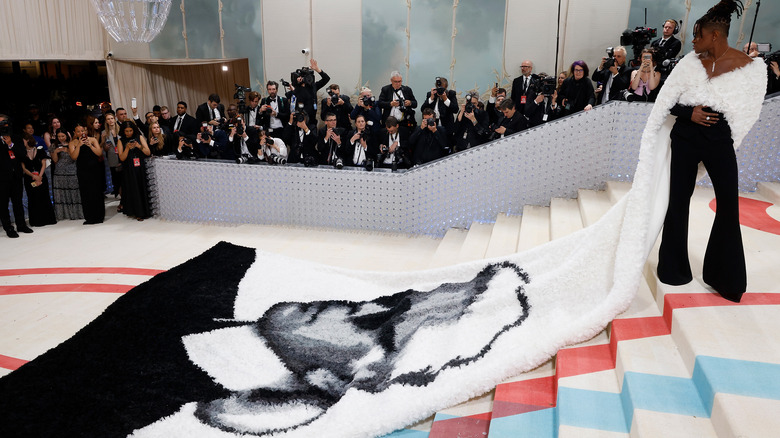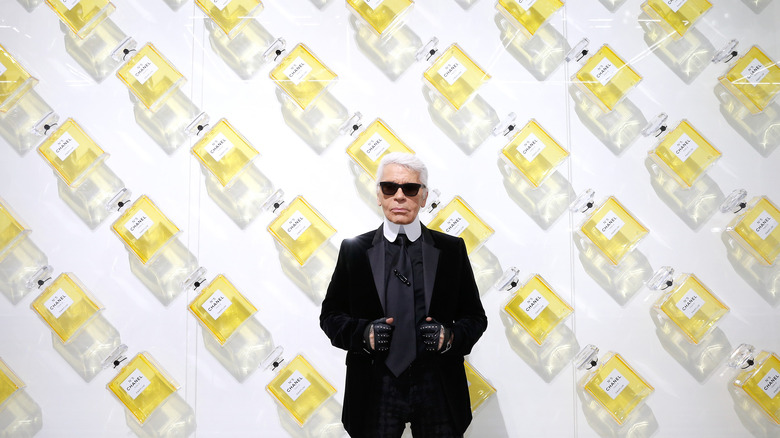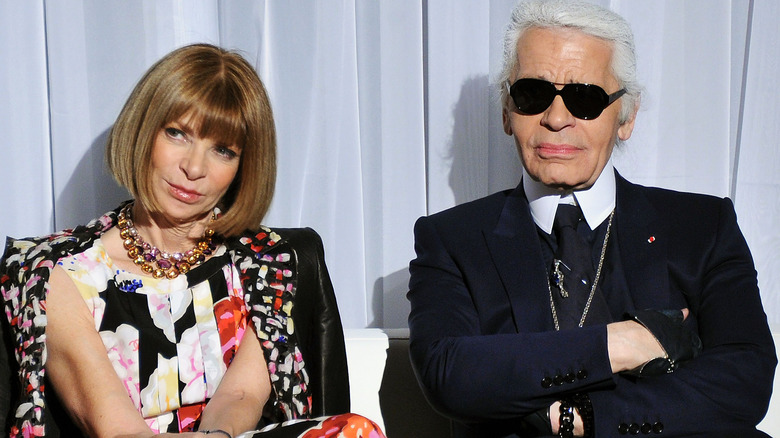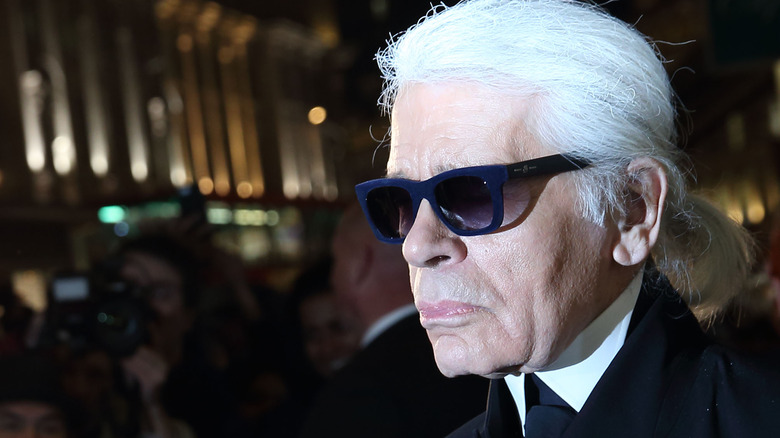The 2023 Met Gala's Celebration Of Karl Lagerfeld Is Nothing Less Than Shameful
You don't have to be a fashionista who pores over issues of Vogue to know who Karl Lagerfeld is and what he means to the fashion world. After the death of Coco Chanel in 1971, Lagerfeld was hired in 1983 to breathe new life into the iconic fashion house that some feared was on its way out, and that's exactly what he did. Despite designing for Fendi in the late 1960s and Chloé throughout the 1970s, it was his work for the House of Chanel that took him to international fame. Lagerfeld and Chanel became synonymous and stayed that way until his death in 2019.
But while Lagerfeld was undeniably a force in the fashion world and a visionary, his name also carries with it another side. He was racist, misogynistic, xenophobic, and fatphobic. Because of this, when this year's Met Gala theme was announced, Karl Lagerfeld: A Line of Beauty, some took issue. The official Twitter page of the Met Gala, HF Twit Met Gala, posted a tweet in mid-April that read: "As we approach the first Monday of May, the hf twitter met gala team would like to announce that we will not be celebrating this year's met gala as our values don't align with the selection of Karl Lagerfeld as the theme. We hope to celebrate with our community again soon."
To call Lagerfeld problematic is a euphemism. In a world where you can choose to be kind, Lagerfeld chose to be unabashedly cruel over and over again. Yet despite this, the Met Gala still chose to honor his legacy, with many celebrities going as far as to even represent him on their fashion choices. And although conversations about separating art from artist have become heated debate topics over the past few years, the decision to platform a problematic figure on fashion's biggest night has us feeling certain it's time we draw a line.
Lagerfeld was fatphobic
Despite being a larger-sized man for the majority of his life, Lagerfeld's hatred toward larger people, and women especially, ran particularly deep. When he lost 92 pounds in just 13 months, the weight loss just contributed to his arrogance against heavy people. Per his book, "The Karl Lagerfeld Diet," his reason for losing weight so quickly was because he wanted to fit into clothes that he couldn't fit into previously. It was at this time that he declared fashion "the healthiest motivation for losing weight," a theory he doubled down on in that same book. As many dietitian would tell you, any diet that promotes drinking mass amounts of Diet Coke like this one does, is far from healthy — Per Jezebel, he reportedly never drank water.
Despite his own issues with weight, Lagerfeld continued voicing his unsolicited and cruel opinions about others bodies, especially when the conversation about size diversity in fashion came up. In an interview with German magazine Focus in 2009 Lagerfeld said, "no wants to see curvy women," and "these are fat mummies sitting with their bags of crisps in front of the television, saying that thin models are ugly." In 2012, Lagerfeld called Adele "a little too fat," then rolled back on his statement, explaining that he meant Lana Del Rey. When Adele lost weight, Lagerfeld took credit for it, suggesting his comments that were supposedly for Del Rey, mind you, were helpful for the singer. If these were the type of things he said in public, one can only imagine how vicious he was behind closed doors.
Lagerfeld's idea of beauty was extremely distorted
Lagerfeld may have created beautiful, innovative, and avant-garde works of art, but when it came to how he felt about how people looked, his idea of beauty was severely warped. Not only did he take issue with Heidi Klum being too heavy for the runway, but he also commented on how "she always grins so stupidly," he didn't like Pippa Middleton's face and suggested she only show her back, and Coco Chanel couldn't have been a feminist because "she was never ugly enough."
While his comments on weight were reserved for women, he didn't hold back on what men he regarded as unattractive. He infamously once commented on singer Seal's skin, hinting a trip to the dermatologist would be a good idea for the singer, and not even Pop Art legend Andy Warhol, who was a friend of Lagerfeld, could escape Kaiser Karl's biting tongue. To him, Warhol was "physically repulsive."
But Lagerfeld's two cents on people's looks didn't stop with friends and fellow celebrities. In 2012 Lagerfeld was a guest editor for Metro World News where he shared that, at least according to his beauty standards, Russian men are "very ugly" and if he lived in Russian, he'd be a lesbian. Also, not that anyone asked him, but in the same interview he commented on the "disgusting habits" of Greeks and Italians. Where as some artists might find beauty in unique and unconventional places, Lagerfeld wasn't one of them. If you didn't fit the mold and his concept of beauty, you were ugly and it wasn't up for debate.
Lagerfeld's politics were archaic
When some people achieve the international fame that Lagerfeld did and had throughout the majority of his adult life, one would hope that somewhere along the line they might try to do or say the right thing, but that wasn't how Lagerfeld rolled. Despite identifying as gay, he was vocally against gay marriage, as well as gay couples being allowed to adopt.
"In the '60s, they all said we had the right to the difference. And now, suddenly, they want a bourgeois life," Lagerfeld said in a 2010 interview with Vice. "For me it's difficult to imagine — one of the papas at work and the other at home with the baby. How would that be, for the baby? I don't know. I see more lesbians married with babies than I see boys married with babies. And I also believe more in the relationship between mother and child than in that between father and child."
Per Telegraph, Lagerfeld was also adamantly against German Chancellor Angela Merkel's open boarder policy that welcomed Muslim refugees, calling Muslims the "worst enemies" of the Jewish people. A bold statement from a man whose parents were members of the Nazi Party. When the #MeToo movement started making waves, Lagerfeld told Número magazine in 2018, he was "fed up" with it and scoffed at the women who came forward with allegations. However, we're also talking about a man who sent Dominique Strauss-Kahn and his wife flowers when they returned to Paris after DSK's rape acquittal, calling the former head of the IMF, a "sweet guy — as long as you're not a woman."
In fashion, it takes a lot more to get canceled
When Karl Lagerfeld died in 2019, one of his most fervent supporters and probably the only person in fashion who didn't find themselves on the wrong side of his insults, Anna Wintour, editor-in-chief of Vogue said in a statement, "Today the world lost a giant among men... His creative genius was breathtaking and to be his friend was an exceptional gift. Karl was brilliant, he was wicked, he was funny, he was generous beyond measure, and he was deeply kind." Creative genius? Absolutely. But kind? Apparently, Anna has a different idea of kindness than the rest of us — which is evident in Lauren Weisberger's 2003 roman à clef "The Devil Wears Prada" that detailed her experiences at Vogue as Wintour's assistant.
Of all the things Lagerfeld said over the years, there was one thing he got right: "The world of beautiful clothing is about 'dreams and illusions.'" It absolutely is. As much as Lagerfeld despised mediocrity and all those fat and ugly people in the world, it's those people who were the ones poring over those imagines because of the dreams and illusions he, and other designers, had created. Despite his humble beginnings, Lagerfeld spent his life looking down on people who weren't much different than he was before he catapulted to fame and wealth. But because the fashion world is so elitist and built on these illusions, trying to see Lagerfeld for what he really was — racist, misogynistic, xenophobic, and fatphobic — is impossible for some (we're looking at you, Anna). So, can we separate the art from the artist?
How to draw a line
But herein lies the problem: When is enough, enough? Picasso was a brilliant artist, but he was also a misogynistic womanizer. As his granddaughter Marina Picasso wrote in her biography "Picasso: My Grandfather," Picasso "submitted [women] to his animal sexuality, tamed them, bewitched them, ingested them, and crushed them onto his canvas... once they were bled dry, he would dispose of them." Chilean poet Pablo Neruda won the 1971 Nobel Prize in Literature, but when his memoir came out a year after his death, he details an incident where raped a woman in Sri Lanka. Jazz genius Mile Davis allegedly pimped out and abused his wives.
By all accounts, like Lagerfeld, these men were horrible people. They were narcissistic artists who, like politicians of today, felt they could get away with everything — and they did. No one talks about the women Picasso drove to suicide or the fact that one of his lovers, Dora Maar, told him, "As an artist you may be extraordinary, but morally speaking you're worthless." An adjective that fits Lagerfeld too.
All this to say, just because someone is phenomenally talented, doesn't give them the right to be garbage humans. We can love Lagerfeld's designs, but we don't have to respect him, nor do we have to honor him. Let's save that level of admiration for people who are making the world a better place. Karl Lagerfeld was certainly not one of those people. Did he make the world more beautiful? Sure. But after the dress comes off, the stitching is still full of hate.





